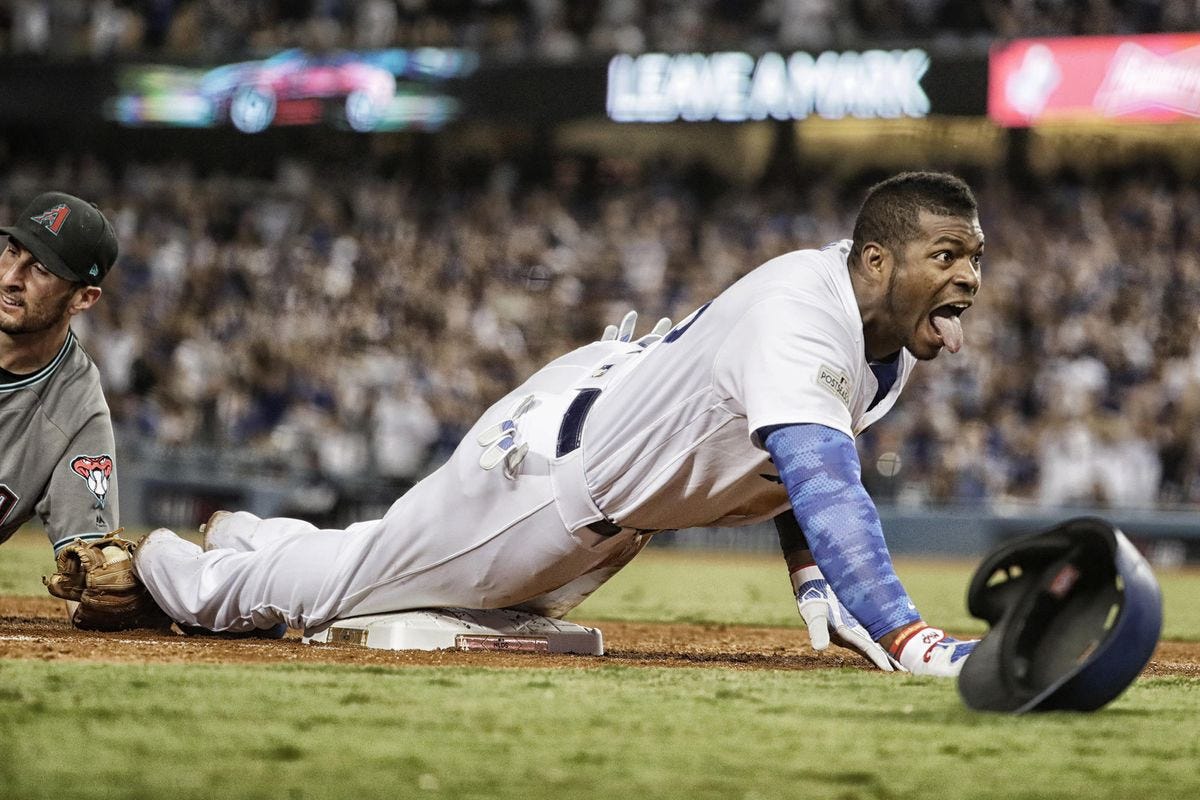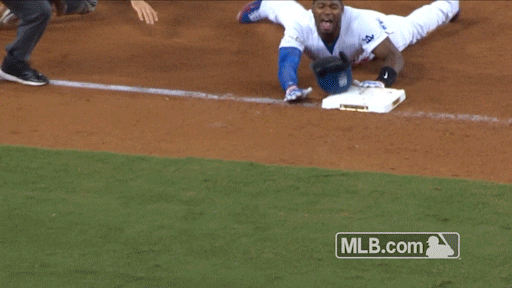
Baseball is boring. There’s no getting around that. It’s a sport comprised almost entirely of anticipation, almost entirely of living with the dread and hope of what could happen rather than what does. A pitch can either go in the dirt and extend an already anxiety-inducing at-bat, or it can be knocked four-hundred feet into the left field stands, or it can be knocked four-hundred feet just right of the peeling yellow foul pole, rendering the pitch usually pointless, or it can speed past a batter at 96MPH, dipping at the last second under his lumber, or it can be hit weakly and dribble with just the right amount of english to roll between two fielders.
Anything can happen; nearly everything has happened.
Usually nothing does.
The Wall Street Journal did a short study of three games in 2013 where they found that there is only about — generously speaking, as this includes light plays like pick-off throws — 18 minutes of action in the average MLB game. 18 minutes, in a game where the average length is 185 minutes.
And yet.
Baseball is the only sport I love deeply. Perhaps irrationally.
I get asked constantly — especially in the second and third quarters of the 162 game season when most people have cooled to the excitement the beginning of a new season brings and have not yet hit the final months’ anticipation that comes with their favorite team making a playoff run — how I could love a sport as monotonous as baseball. I watch approximately 150 Dodgers games a year, not including the playoffs. Usually on television. And when I’m not watching, I’m frantically and rudely refreshing my MLB app in public on my phone for play-by-play updates. I have a routine: I get home from a long day of teaching, I make a simple dinner, I open a fancy Belgian beer, and I plop myself down on my love seat to watch the game.
I watch every game with the same intensity and focus that I would watch the seventh game of the World Series.
There are a myriad of reasons why baseball is the sport that cuts to my heart, but I want to focus on just one:
Yasiel. Puig.
In 2018, the Dodgers abruptly traded away fan favorite, resident goofball, and “Wild Horse” (as coined by Dodgers legend Vin Scully) Yasiel Puig. Puig is, depending on your opinion of him, either famously or infamously known for his childlike and unpredictable antics.
A few examples include:

Licking his bat before smacking an RBI double in Game 1 of the 2017 NLDS.

Wagging his tongue after hitting a triple in the same game as above.

Kissing Turner Ward, his hitting coach and father figure, after hitting home runs.

Dancing in the dugout after a teammate’s homerun.

Or this Louvre-ready image of him taking on literally ALL of the Pittsburgh Pirates in an on-field brawl.
This list could go on forever. Just check Giphy.
He’s also known for being an erratic presence in the locker room. One story from Molly Knight’s The Best Team Money Can Buy recounts a time when Zack Greinke, a particularly socially earnest former Dodgers pitcher, threw Puig’s bags onto the sidewalk when he refused to close the team bus’ luggage bay. Some argue that he’s never fully living up to the superstar potential he showed in his wildly successful debut season.
But to watch baseball every day is to see the full and complex humanity of someone like Puig.
I know things about Yasiel. I know that when he was in Cuba, he was making $17 a month to play baseball in the government-run sport system. I know that he risked his life in attempts to defect from Cuba at least four times before reportedly promising smugglers $250,000 to assist him in his defection. I know that he was held captive in a hotel room for 29 days while his smugglers awaited payment. And then, after his safe arrival in the States, he promised 20% of his salary to someone allegedly connected to the cartel to help pay off his debt. I know that there was one season where there were fears that he may not return to the field because of these unpaid debts to the cartel. I know that when he participated in the Home Run Derby in his rookie season, he asked his friend Robinson Cano’s father, who was pitching to his son in the Derby, to also pitch to him because he had no one else to toss batting practice to him— not a dad, a brother, or even a coach he felt close to; he hit zero home runs in that competition. I know that his relationship with his first manager, Don Mattingly, was filled with strife, a relationship that brings to mind that of a bitter teacher and a troublemaking student. I know that during his last season with the Dodgers, his home was robbed four times.
He also responded to the newly drafted Rams quarterback Jared Goff’s rude comment about wanting to see him get hit with a fastball in the ribs with what would later become his catchphrase:
#PuigYourFriend
I also know that he was frequently late to practices. I know that he threw fits about not being in the starting line-up regularly, one of many reasons he may have been traded. I know that he often made Little League-like mistakes on the base paths that led, on more than one occasion, to avoidable losses. He overthrew the ball in attempts to make impossible put outs at third, allowing runs to score where none would otherwise. He annoyed his teammates. He angered his coaches.
Still, even with these flaws, the Dodgers seemed to find a balance with him over his last couple of seasons with the team. The coaches learned to walk the fine line between holding him accountable to being a better person and player while also allowing him to put on full display the exact, enjoyable-to-watch player he is. This is what great teaching is, after all. A great teacher doesn’t scold you for what you aren’t, as Mattingly seemed to do so often. A great teacher figures out who you are and helps you be the best version of yourself. This was most apparent in his relationship with his batting coach Turner Ward, a coach he followed, perhaps appropriately, to the Cincinnati Reds.
Baseball stat-heads might deride this all as narrative. I have connected to Puig through, as Joan Didion puts it, “the imposition of a narrative line upon disparate images.” In many instances, I have left out convenient details of the story to better fit my ideal version of Puig’s career as a Dodger. In my head, I can make Puig’s time in Dodger Blue one of redemption: a kid with a tough background who just needed a little bit of fatherly and brotherly love, who needed a group of people to just give him one more chance at doing well. It’s dough-eyed and idealistic, but it’s also life affirming.
Someone else could justifiably tell the story of a young hard knock kid from Cuba who never figured out how to grow up once he arrived in Los Angeles and was drowned in money and a spotlight.
Another person could just as equally look at the numbers on Fangraphs and find a guy with decent defense and inconsistent power but a controlled and desirable price tag.
The answer, as always, is somewhere in the middle of all of these and so many other stories.
The truth is that it’s all projection. I am looking for my own existence in the world to be represented in the thing I love. I am projecting my own relationship with my father and family onto Puig’s relationship with his coaches and teammates. I am looking for my own relationships with my high school students in Ward’s and Dave Roberts’ relationship with Puig. I am looking for progress and hope in a world where it feels right now like there’s little.
I am looking for an arc.
And this is what makes baseball so beautiful. Its seemingly never-ending season allows these sorts of connections to players and stories and ideas. For me, baseball is not an escape from reality. In fact, baseball is a means to dive deeper into it, to connect more freely to it. Even as I could never fathom the physical ability it takes to heave a baseball 100MPH, I can bask in the humanity of it all. I can see myself in the self-punishing belts that Puig would give to his shoulders with his bat between swings. I can see the metaphor in the scoreboard, the simile in the slash lines. Yasiel Puig did not give me a window out of my life. Instead, Puig gave me a skewed mirror by which to see myself; broken, full of potential, healed, tongue wagging in the fluorescent lights.



